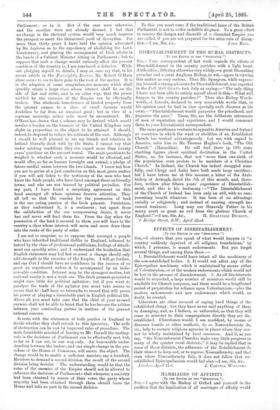DISESTABLISHMENT IN THE RURAL DISTRICTS.
rTo THE EDITOR OF THE "SPECTATOR."' SIR,— Your correspondent of last week regards the effects of Disestablishment in the country parishes with a light heart. Authorities, differing otherwise very widely,—a great Dissenting preacher and a great Anglican Bishop, to wit,—agree in viewing this matter as very serious. Thus Mr. Spurgeon, while expressing himself a strong advocate for Disestablishment, was reported in the Pall Mall Gazette last July as saying,—" The only thing I have not been able to satisfy myself about is this,—What will happen to the country parishes ?" Thus also Bishop Wordsworth, of Lincoln, declared in very memorable words that, in his opinion (and he had in view specially such dioceses as his own),—"Disestablishment would pauperise the priesthood, and paganise the poor." These, Sir, are the deliberate utterances of men of reputation and experience, and I would commend them to your Liberationist correspondent.
The same gentleman ventures to appeal to America and Ireland as countries in which the want or abolition of an Established Church has worked advantageously. Let me, with regard to America, refer him to Mr. Thomas Hughes's book, "The Old Church (Macmillan). He will find there (o. 118) some startling figures about spiritual destitution in the United States, as, for instance, that not "more than one-sixth of the population even profess to be members of a Christian Church." In Ireland, the Church has indeed struggled man fully, and Clergy and Laity have both made large sacrifices; but I have before me at this moment a letter of the Archbishop of Armagh, dated the 7th of this month, and, therefore, written after fifteen years' experience of Disestablish ment, and this is his testimony :—"-The Disestablishment of the Church of Ireland has been only an evil, with no compensating benefit whatever. It has been of no advantage socially or religiously; and instead of causing strength has caused weakness. Long may our Heavenly Father in his mercy avert so great an evil from the glorious Church of England !"—I am, Sir, Ste., H. GRANVILLE DICKSON. 9 Bridge Street, S. W., April 22nd.


































 Previous page
Previous page